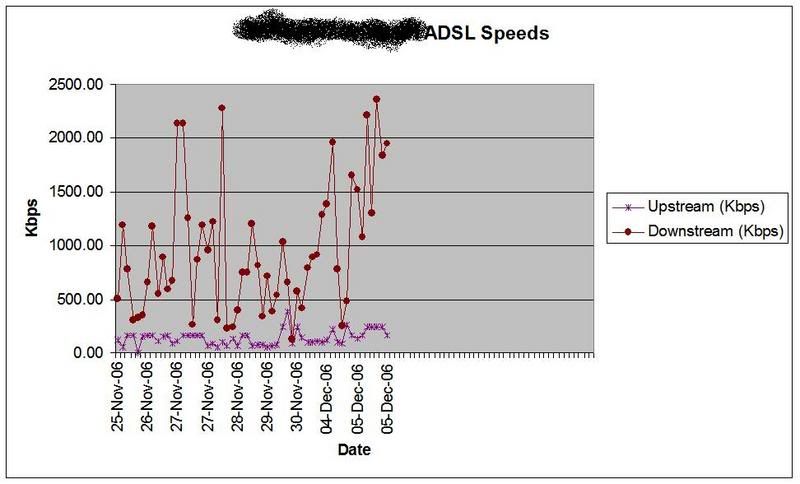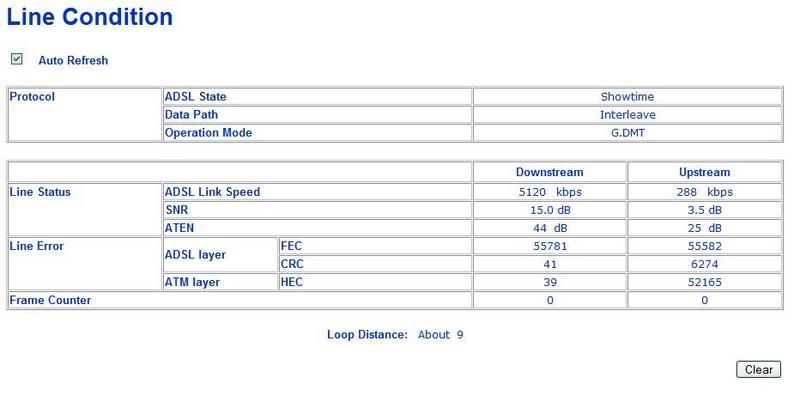I'm sure my readers are more knowledgeable about ADSL than I am so let's see if you can help me out.
In short, the connection is slow and highly variable. Here is a graph of upload and download speeds over the last week:

You will observe that both upstream and downstream speeds are ultra-variable.
I have one telephone socket, which is of the type where the front faceplate can be removed to reveal another, hidden socket behind it. The back of the faceplate has a plug in it such that when the faceplate is attached, the faceplate is "plugged in" to the "secret" socket. I believe this socket is known as an "NTE5" socket. Look at "Part III" of this document to see what I'm talking about. (There are no wires attached to the back of my faceplate, which I assume means there are no extension sockets in the flat)
A sample screenshot from my router's "Line Condition" screen shows the following:

You will observe the following:
- The downstream attenuation is high
- The number of errors ("FEC", "CRC", "HEC") that are being dealt with per second is horrific
- The router claims that it is getting a downstream rate of 5120 Kbps. That may well be the speed it has negotiated but the errors are ensuring I get nothing like that.
Here is what I have done so far in an attempt to improve the situation:
- Moved the router from the kitchen into the living room in case there was electrical interference in the kitchen
- Stopped using the dimmer switch in the living room as I read this can cause interference
- Re-routed the power to the router so that it is as far away from the phone line as possible
- Tried disconnecting and powering-off the cordless phone
- Bought a new micro-filter
- Plugged the micro-filter directly into the "secret" phone socket
- Upgraded the router's firmware
- Spoken to the building manager to understand how the phone cable gets into the flat. He says that it is taken from a "distribution point" in the fire escape.
I have also spoken to my ISP several times and they have asked BT to check the line several times. BT reports no fault but the ISP agrees that there is a lot of "noise" on the line and that the number of errors is abnormally high.
So, given all this, what do you suggest I do?
My inclination is to request that a BT engineer comes out to do some tests (downside: I'll be charged £50 if they find no fault).
Can anybody suggest anything else apart from that?

6 comments:
Are voice calls okay, or do you sometimes get noise? You could try a different router, but I doubt that will make any difference.
Why is the number of errors upstream proportionately higher?
Incidentally, you will probably be relieved to learn that some people are less knowledgeable about ADSL than you (and your blog's readers).
Nice link :-)
As for the calls... voice calls are fine. There is some noise on the line but I'm not sure if that is because the phone is cordless (it's digital so you would hope not but still....).
As for up/down errors... sometimes it's the other way round.
My router uses a lower frequency range for downstream and higher for upstream. It's conceivable that the noise affects the upstream band more than down... not sure.
'I'll be charged £50 if they find no fault'
I went through the same discussion with Plus.net when BT screwed up my broadband. My argument runs something like this:
- I'm paying you (Plus.net) to provide a broadband service.
- You are working 'in partnership' with BT to provide it.
- It isn't working.
- My router is fine, as I've tried one of a different model borrowed from a friend which didn't work either.
- Therefore, it's up one of you to fix the problem, and up to Plus.net to take the lead, as I'm paying them directly for the broadband service.
I'm pretty certain that argument is approximately congruent with the Sale of Goods Act.
I think the same argument applies in your case. Just because they may not be able to explain away the issue doesn't mean they aren't liable for fixing it. BT are not within their moral and probably legal rights to charge you £50; only your ADSL provider.
I don't know how far that argument will get you in practice, although I found Consumer Direct to be surprisingly helpful:
http://www.consumerdirect.gov.uk/contact_us.shtml
It also allows you to correctly say you've taken 'legal' advice, which is probably helpful.
Hi Andrew,
That is, of course, a good point: my contract is with Freedom2Surf.
However, where I think I will have to apply fancy footwork with my arguments will be:
1) What have they contracted to provide? i.e. can they argue that what I have is acceptable and therefore the engineer visit is an optional extra that I should pay for?
2) Given that I also have a contract with BT (for the rental of the line), is it not the case that their sending of an engineer to test it is handled under BT's terms and conditions and pricing structure?
Well, you'd need to check the terms and conditions, but judging from what I've heard, that isn't 'industry standard' or 'reasonable' performance.
How they (the ISP - who's the guilty party?) choose to solve the problem is really up to them. I noticed that Plus.net had a sneaky trick of trying to involve me in the problem-solving. It's to your benefit to know what's going on, but don't let them defer the decision onto you - 'sure, you can send a BT guy round if you think that'll help - but you're paying for it'. I explicitly said in every interaction that I would only pay if it turned out I had done something wrong - they did eventually escalate to BT under those terms.
You do have a separate contract with BT, which I'll admit probably confuses the issue, although the liability still rests with one of them - your difficulty is going to be in stopping them from finger-pointing at each other. Ultimately, my argument was that although BT are providing the physical line, Plus.net (in my case) were providing broadband service, so they were responsible. That's a tough one to argue, I'll admit.
Andrew - thanks for the perspective. I am usually fairly assertive in ensuring I get my problems sorted but, possibly due to conditioning, I have falled into the trap of believing it was my responsibility to do problem determination work, decide on whether to pay for an engineer and mediate between F2S and BT.
You're quite right... I'm paying F2S for a reliable internet connection. It's their job to sort it out.
If the performance remains erratic into tomorrow, I'll get on the phone and drop the nice guy act :-)
Post a Comment